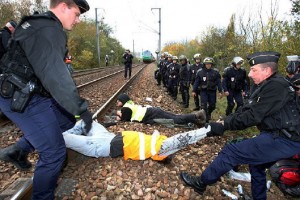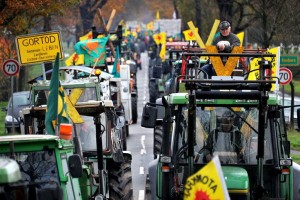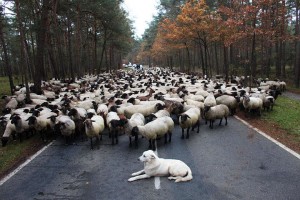The periodic shipment of nuclear waste from a reprocessing facility in France to the burial dump at Gorleben, Germany, has long inspired mass nonviolent direct actions, and the scale and intensity of this year’s resistance eclipsed any previous mobilization.
German anti-nuclear sentiment has been stoked by the government’s recent decision to extend the lifetime of current nuclear power plants, guaranteeing even more waste production.
The latest special train bearing the massive “castor” storage casks left from France on Friday, November 5, for the 900 mile trip. The train was soon stopped for three hours near Caen, Normandy, where police arrested five activists who had chained themselves to the tracks and detained about 30 others. A banner in German displayed among hundreds of supporters nearby declared “Our resistance knows no borders.”
More than 30,000 people began assembling in Dannenberg, where the train was due on Sunday, November 7. There, the castors would be unloaded for transport by special trucks the final few miles to the disposal site.
All along the route through Germany, thousands more converged to block the tracks and delay the train’s progress with a tactically diverse series of actions, large and small. Among many reports was that of two activists who suspended themselves over the tracks from a high bridge near Morschen, stopping the train for two hours.
Saturday night, more than a thousand people joined the “Castor Schottern” action, removing the gravel ballast from under 150 meters of track. Police responded with tear gas, pepper spray and batons, gassing hundreds and breaking more than a dozen bones. The track had to be repaired before the train could proceed.
Sunday afternoon, police could not fully control the situation when some 5,000 people, including hundreds of farmers in their tractors, blocked a large section of track at Gedelitz. The train was stalled again as police regrouped. Overnight, they moved in to clear the track, disperse some blockaders and hold 1,000 or more in custody next to the tracks while the train moved past. Two additional serious injuries were reported – one blockader stepped on by a police horse, and another who fell from a tree after being hit with pepper spray.
Mid-morning Monday, the train arrived at Dannenberg. While the casks were being transferred to the trucks (an 8-hour affair), Greenpeace activists disguised in a beer delivery truck used the vehicle to block the road out. Some chained themselves beneath it. When police were finally able to clear that obstruction, they found the road blocked a little farther along by 2,000 sheep and more tractors. Finally, before the casks could reach their destination, police had to remove 5,000 more people who were camped in the street, next to the storage facility.
After the casks arrived, the police union was questioning why it had to carry the consequences of a bad nuclear policy.


